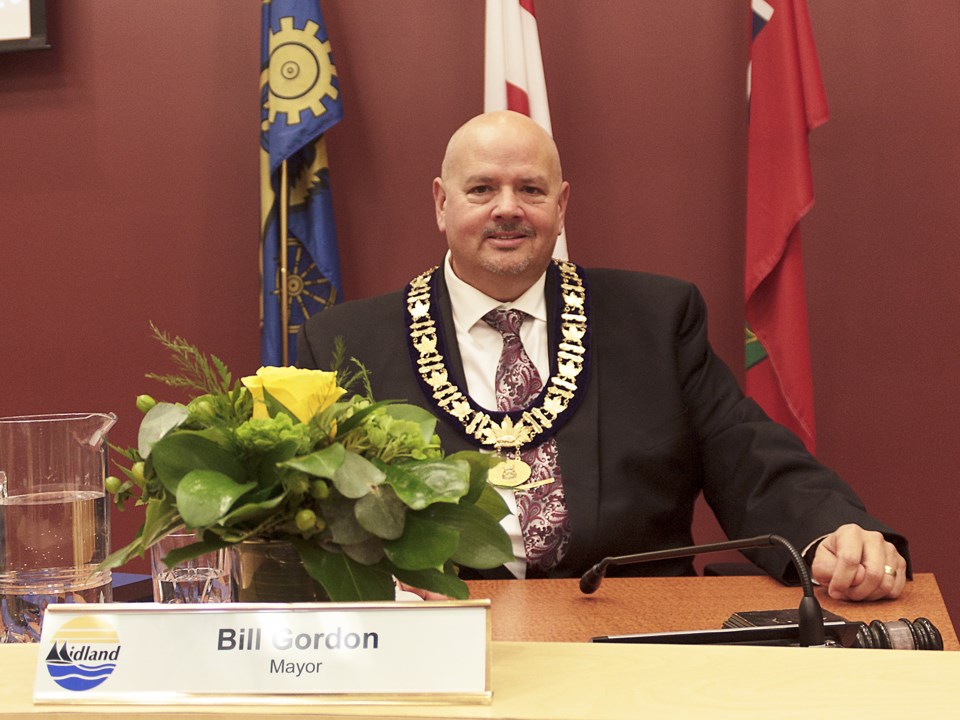With concerns rampant over perceived increases in crime and some not feeling safe to walk outdoors, Midland’s mayor is trying to figure out a solution.
Bill Gordon meets this week with a major security provider and Southern Georgian Bay OPP detachment commander Insp. Todd Pittman to discuss options, jurisdiction and scope out what that relationship could look like in our community while getting an idea on potential costs.
Gordon says that once he has a better grasp on this, “assuming any of it is feasible,” he would bring a request to council as a budget request, which if approved, would lead to an RFP and then begin next spring.
“In a nutshell, the concept is to explore having private security contracted to do both foot patrols and driving patrols of security hotspots in our community to act as a deterrence and to contact police when they see a situation that should result in prioritized police response,” Gordon tells MidlandToday.
The challenge, according to Gordon, is the fact that security guards only have authority on private property, meaning they have no authority on public property such as the town’s sidewalks and streets.
That said, Gordon notes that town parking lots, the harbour and any of its buildings would qualify as private property.
“The roving patrols of our downtown and residential neighbourhoods are primarily deterrence as most criminal activity relating to property (thefts, mischief etc.) are deterred by having any witnesses or the likelihood of being detected,” Gordon explains.
“In our downtown core, property owners could join this program by entering into an agreement with the security company to exercise their authority on and in relation to their property, which includes their storefronts.”
As well, Gordon notes there may be options to bestow bylaw enforcement authority to supplement existing staff outside of normal working hours (ie nights and weekends).
“We already bestow bylaw powers on some of our roads/operations team so they can tag and tow vehicles that interfere with snow clearing operations,” Gordon says.
“Bylaw powers aside, the increased presence of trained security officers in our community can add to the feeling of safety, detect and deter crime and augment the same efforts that are part of the job of police officers.”
Gordon says that normally, if the town felt a need for more police presence, it could just assign more officers to that effort.
“But since we are in a contract relationship (with) the OPP, and we have to share their finite resources with our neighbours who are part of the Southern Georgian Bay OPP's detachment area, we don't have that authority,” he says.
“The OPP will deploy based on their staffing model and based on the ebb and flow of their calls for service, with proactive patrols (foot and cruiser) being on duty when time permits."


(OPP Insp. Todd Pittman and Mayor Bill Gordon are pictured in these MidlandToday file photos)
Gordon says it’s frustrating that there are no dedicated Town of Midland police officers since the local OPP's entire officer contingent is shared between the town, Penetanguishene along with Tay and Tiny Townships.
“The province has had a moratorium on the addition of dedicated police officers to a community's contract for many years, so we could not get these dedicated officers even if willing to pay extra for them - and I would bet that our ratepayers would gladly do so if it were possible,” he says.
“Oddly enough, we can pay for more civilian resources, which presents another challenge.”
There’s also the potential for special constables, who are specially trained civilian members of a police service and empowered with peace officer status, equipped with non-deadly, use-of-force options. They're now frequently used as front-line police on transit systems, government facilities like Queens Park and many university campuses.
“The OPP does not generally use special constables for front-line policing and instead they are used as court officers, prisoner handling/transport and some technical investigation duties and other tasks where peace officer authorities and protections under the Criminal Code are required,” Gordon says.
“Asking the OPP to consider a pilot program that extends their special constables to roles similar to those used by transit and university campuses would be the next step and our detachment commander Todd Pittman and I have been working on that for a few months now.”
Gordon emphasizes that this will not be a quick process as it is “a paradigm shift” for the OPP, which would need the go-ahead from senior command staff and involve negotiations with the police association.
“So for now, either do nothing and receive the same levels of service, or look for new approaches to accomplish our desire to have more visibility and deterrence in our community,” he says.
“Private security may be a way to fill that gap while we work towards the special constable pilot, or the province allows municipalities to contract dedicated officers for their communities. Neither of these outcomes appear to be on the near horizon.”
